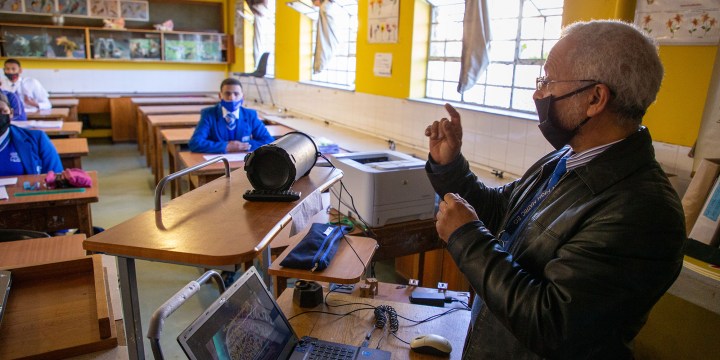ALERT LEVEL 1
Teachers with comorbidities told to return to school

Teachers working from home because of comorbidities will return to contact teaching as South Africa moves to Alert Level 1 on Monday 21 September.
It’s crunch time for educators granted concessions to work from home during Alert Levels 2 and 3.
This follows the announcement by President Cyril Ramaphosa on 16 September about the country’s move to Alert Level 1.
A collective agreement by the Department of Basic Education (DBE), teachers’ unions and the Education Labour Relations Council on 30 May allowed educators with comorbidities to apply to be granted the concession to work from home under Alert Levels 3 and 2 of the National State of Disaster.
“A concession in this instance refers to an employee with any condition which may place him/her at a higher risk of complications if they are infected with Covid-19 and employees aged 60 and above who are at a higher risk of complications if they are infected with Covid-19,” the agreement states.
The agreement was the result of a collective battle fought by teachers’ unions to compel the DBE to provide health guidelines on how educators over the age of 60 and those with comorbidities should be treated upon the reopening of schools.
The DBE acted unusually swiftly, following the president’s announcement, to publish a statement (dated 19 September) telling educators granted concessions to return to school on Monday 21 September when Level 1 kicks in.
“The implication of the announcement by the president of moving the country to Alert Level 1 means the concessions to work from home will no longer apply from midnight on Sunday 20 September 2020,” reads the DBE statement.
“The affected people will therefore have to report for duty with effect from Monday 21 September. If, however, some individuals are still not well, they are advised to follow the normal sick leave protocols,” the statement continued.
Two teachers’ unions with the largest teacher membership combined said they supported the move, contingent on schools providing a safe environment. Those who still fear the risk of contracting the virus were encouraged to apply for normal sick leave.
“We encourage teachers who are sick and feel like they cannot work to apply for normal leave catered for in the personnel administrative measures,” said Nomarashiya Caluza, the provincial secretary of the SA Democratic Teachers’ Union (SADTU).
Caluza commended those educators who have been working “right through this period” and with a reduced staff complement. “They worked hard and were overworked because the department could not provide substitute teachers.”
The department’s director-general responsible for planning, information and assessment, Paddy Padayachee, previously told Parliament that hiring substitute teachers to replace those who had been granted concessions would add R650-million a month to the wage bill.
The department said it could not afford this and although teachers granted concessions were required to continue to work from home, some schools struggled to provide resources for them to do so.
“We need to ensure that the schools, the teachers themselves and the department are ensuring that the safety measures are strictly adhered to so that the health concerns of the teachers returning on Monday are looked after,” urged Basil Manuel, the executive director of the National Professional Teachers’ Organisation of SA (Naptosa).
Revised pass requirements for grades 10 and 11
Other major developments in the education sector are the changes announced by the DBE’s director-general, Hubert Mweli, regarding promotion requirements for grades 10 and 11.
In a circular published on 12 September, Mweli brought into effect a policy change that will see school-based assessments account for 60% of learners’ marks, as opposed to 25% before Covid-19.
The examination component will account for 40% as opposed to 75% before the pandemic disrupted education.
Furthermore, full-scale examinations will be replaced with controlled tests.
“Controlled tests should only be set on content taught, content not taught cannot be assessed,” the circular states.
Other changes made were to the duration of tests, weightings on the exam component and oral component in the case of languages and the number of papers written for elective subjects.
The changes are temporary and only apply to the 2020 academic year. DM
"Information pertaining to Covid-19, vaccines, how to control the spread of the virus and potential treatments is ever-changing. Under the South African Disaster Management Act Regulation 11(5)(c) it is prohibited to publish information through any medium with the intention to deceive people on government measures to address COVID-19. We are therefore disabling the comment section on this article in order to protect both the commenting member and ourselves from potential liability. Should you have additional information that you think we should know, please email [email protected]"






 Become an Insider
Become an Insider